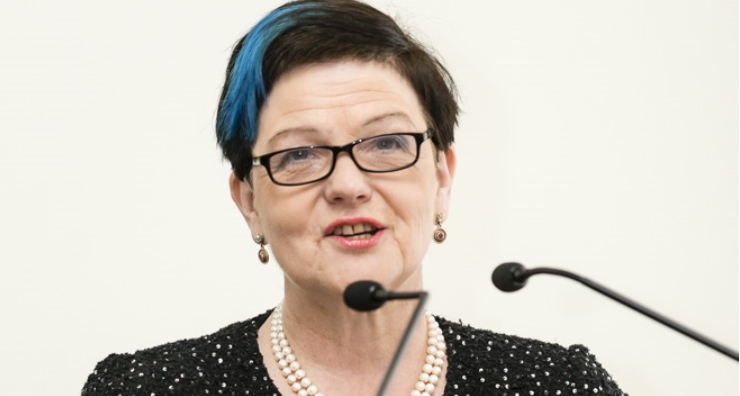Driving commercial and political engagement between Asia, the Middle East and Europe
Driving commercial and political engagement between Asia, the Middle East and Europe
Driving commercial and political engagement between Asia, the Middle East and Europe

The UK Government is investing heavily in promoting innovation and business collaborations with Asian countries.
That was the crux of the keynote speech by Baroness Neville-Rolfe DBE CMG, Parliamentary Under Secretary of State for Business, Innovation & Skills and Minister for Intellectual Property, at the ‘Partnering with Asia for Global Innovation’ conference, held in partnership with Rio Tinto, which took place at Asia House on 11 December, 2014.
“It’s obvious no country will be successful if it innovates in isolation. You have to have a network,” Neville-Rolfe said.
“It’s important we have the tools to support innovators in the global race to develop international partnerships, especially with Asia. We need to collaborate with Asia on innovation,” she said.
She said there were two sources of economic progress: efficiency and discovery or innovation. “And the difference between them is not absolute,” she said.
“There must be a limit to efficiency, but there is no limit to innovation. So it’s likely to become more important,” she added, insisting the UK Government was ensuring conditions for innovators to succeed were in place.
She then listed a series of accolades the UK had on this front, for example in 2014 the UK had moved to second place out of 142 countries in the 2014 Global Innovation Index, the annual rankings of world economies’ innovation levels published by Cornell University, INSEAD and the World Intellectual Property Organization (WIPO, a specialised agency of the UN).
According to the World Economic Forum, the UK ranks second in the world for university-industry collaboration, behind Switzerland but ahead of the US.
It has the best functioning IP system in world, and a “functioning tax environment with tax credits supporting R&D,” she added. The number of firms claiming R&D tax credits in the UK has risen year on-year since 2005/06 , particularly amongst SMEs, she said.
Innovate UK, an executive-non departmental public body, sponsored by the Department for Business, Innovation & Skills, has received up to £536 million from the Government this year to support SMEs with high-growth potential and to identify and invest in innovative sectors. It is now working closely with UKTI (UK Trade & Investment), she said. The Department for Business, Innovation & Skills also runs the website www.greatbusiness.gov.uk which provides information and advice for new businesses in the UK.
She also spoke about Catapult Centres, which are a network of world-class centres set up by Innovate UK to transform the UK’s capability in different areas. Digital Catapult, for example, which was set up to grow the digital economy, has now partnered with Copyright Hub to make copyright licensing in the digital content space easier and reduce infringement. Other measures to boost startups included the Cisco British Gateway (BIG), a UK-wide series of initiatives and partnerships to enable tech entrepreneurs to flourish.
“I am keen to access funds in Asia and to support the effort in Asia,” Neville-Rolfe added. “Countries like Singapore, Korea and Japan have lots of expertise to offer us in things like smart cities, automobiles and robotics. It is challenging to operate in Asia and I know there are concerns about IP (intellectual property) rights, particularly in China,” she said.
IP was not just for international engagement – it protects domestic ideas too, she said, adding the UK Government was now working with China on protecting IP there.
“The situation is now getting better in Asia,” she said. “China is moving to a higher level because they own patents so their attitudes are changing. There is a very close relationship between the UK and China on IP. People know we are good at IP. Our IP office is operating internationally advising governments on best practice and helping them to set up procedures,” she added.
“We have made some good progress. China and India are moving up the value chain and investing in science and innovation and becoming the world leaders. China has a great appetite to work with the UK on these areas, as well as on urbanisation and reducing pollution too,” she added.
“The Chinese have now put climate change and reducing pollution as part of their Five-Year Plans,” she said. Indeed last month President Obama and President Xi Jinping jointly announced a landmark climate deal to reduce carbon emissions.
Meanwhile the UK’s Newton Fund (part of the UK’s Official Development Assistance) which was launched this year, will receive £75 million each year for five years to develop science and innovation partnerships that promote the economic development and welfare of developing countries. The partner countries the UK will work with under the Fund include China, India, Indonesia, Malaysia and Thailand.
There are still some stumbling blocks though. One of the panellists at the conference, Professor Chris Rudd, Pro-Vice Chancellor, University of Nottingham, which has a campus in China, said: “Europe has the technology and China has the capital so it should be easy but it isn’t. There is lots of technology that is at a very early stage, but the Chinese investors want to turn it into cash straight away.”
All photos were taken by Miles Willis.
naomi.canton@asiahouse.co.uk
Asia House will hold its next Signature Conference titled ‘Asia’s Digital Transformation’, in partnership with McKinsey, on 28 January, 2015. Parminder Singh, Managing Director of Twitter (Southeast Asia/India/MENA) is one of the confirmed speakers. For more information click here.
